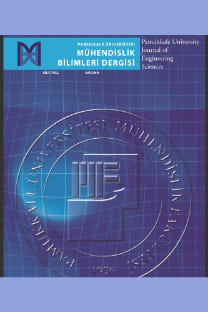2 boyutlu sıfıra çeken LMS algoritmasıyla görüntü iyileştirme
LMS, Görüntü iyileştirme, Seyrek sinyaller
Image denoising with two-dimensional zero attracting LMS algorithm
LMS, Image restoration, Sparse signals,
___
- Widrow B, Hoff M.E. “Associative storage and retrieval of digital information in networks of adaptive neurons”. Biological Prototypes and Synthetic Systems, 160-160, 1962.
- Haykin S. Adaptive Filter Theory. 5th ed. USA, Pearson, 2014.
- Hussain U, Kumar S. “Adaptive echo canceller using LMS algorithm”. International Journal of Advance Engineering and Research Development, 2(8), 54-59, 2015.
- Wang X, Gu Y, Chen L. “Proof of convergence and performance analysis for sparse recovery via zero-point attracting projection”. IEEE Transactions Signal Processing, 60(8), 4081-4093, 2012.
- Wright J, Ma Y, Mairal J, Sapiro G, Huang TS, Yan S. “Sparse representation for computer vision and pattern recognition”. IEEE Proceedings, 98(6), 1031-1044, 2010.
- Czink N, Yin X, Ozcelik H, Herdin M, Bonek E, Fleury B. “Cluster characteristics in a MIMO indoor propagation environment”. IEEE Transactions on Wireless Communications, 6 (4), 1465–1475, 2007.
- Vuokko L, Kolmonen VM, Salo J, Vainikainen P. “Measurement of large-scale cluster power characteristics for geometric channel models”. IEEE Transactions on Antennas and Propagation, 55(11), 3361–3365, 2007.
- Gui G, Peng W, Adachi F. “Improved adaptive sparse channel estimation based on the least mean square algorithm”. IEEE Wireless Communication and Networking Conference, Shanghai, China, 07-10 April 2013.
- Chen Y, Gu Y, Hero AO. “Sparse LMS for system identification”. IEEE International Conference on Acoustics, Speech and Signal Processing, Taipei, Taiwan, 4 April 2009.
- Wang X, Gu Y, Chen L. “Proof of Convergence and Performance Analysis for Sparse Recovery via Zero-Point Attracting Projection”. IEEE Transactions on Signal Processing, 60(8), 4081-4093. 2012.
- Taheri O, Vorobyov SA. “Sparse channel estimation with lp-norm and reweighted l1-norm penalized least mean square”. IEEE Conference on Acoustics Speech and Signal Processing (ICASSP), Prague, Czech Republic, 22-27 May 2011.
- Gu Y, Jin J, Mei S. “l0-Norm constraint LMS algorithm for sparse system identification”. IEEE Signal Processing Letters, 16(9), 774–777. 2009.
- Su G, Jin J, Gu Y, Wang J. “Performance analysis of l0-norm constraint least mean square algorithm”. IEEE Transactions on Signal Processing, 60(5), 2223-2235, 2012.
- Mancera L, Portilla J. “l0-Norm-Based sparse representation through alternate projections”. IEEE International Conference on Image Processing, Georgia, USA, 08-11 October 2006.
- Hadhoud MM, Thomas DW. “The two-dimensional adaptive LMS (TDLMS) algorithm”. IEEE Transactions on Circuits and Systems , 35(5), 485-494, 1988.
- Abadi MSE, Nikbakht S. “Image denoising with two-dimensional adaptive filter algorithms”. Iranian Journal of Electrical & Electronic Engineering, 7, 84-105. 2011.
- Zhang X, Jiang T, Li Y. “2D sparsity-information-aided least mean square algorithm for sparse image de-noising”. Wireless Communications & Signal Processing Conference, Yangzhou, China, 13-15 October 2016.
- Kockanat S, Karaboga N. “A novel 2D-ABC adaptive filter algorithm: A comparative study”. Journal of Digital Signal Processing, 40, 140-153, 2015.
- Lebrun M. “An analysis and implementation of the BM3D image denoising method”. Image Processing On Line, 2, 175-213, 2012.
- Muneyasu M, Uemoto E, Hinamoto T. “A novel 2-D adaptive filter based on the 1-D RLS algorithm”. IEEE International Symposium Circuits and Systems, Hong Kong, 12 June 1997.
- Yang J. Adaptive Filter Design for Sparse Signal Estimation. Ph.D. Dissertation, University of Minnesota, Minnesota, USA, 2011.
- ISSN: 1300-7009
- Başlangıç: 1995
- Yayıncı: PAMUKKALE ÜNİVERSİTESİ
Heterojen LTE ağlarda femto hücreler için güç yönetim eniyilemesi
Ahmet AKBULUT, Aykut KALAYCIOĞLU
Değişken hızlı rüzgâr türbinleri için geri adımlamalı doğrusal olmayan bir denetleyici tasarımı
2 boyutlu sıfıra çeken LMS algoritmasıyla görüntü iyileştirme
Gülden ELEYAN, Muhammed SALMAN
Yazılım geliştirme taleplerinin metin madenciliği yöntemleriyle önceliklendirilmesi
Murat Can TEKİN, Volkan TUNALI
İlişkisel veri tabanlarında XML veriler için Homoglif dönüşüm tabanlı damgalama
Mustafa Bilgehan İMAMOĞLU, Mustafa ULUTAŞ
Otomotiv akülerinde problem tespitine yönelik hücresel ölçüm ve hata teşhis sistemi
Osman DEMİRCİ, Burcu ACAR DEMİRCİ, Sezai TAŞKIN
Tarımsal alanlarda yüksek çözünürlüklü IKONOS uydu görüntüsünden nesne-tabanlı ürün deseni tespiti
Beste TAVUS, Kamil KARATAŞ, Mustafa TÜRKER
Kutuplaştırılmış veri üzerinde ikili sınıflandırma için sürekli zamanlı eşik değeri belirleme
Ali SAĞLAM, Nurdan AKHAN BAYKAN
Şebekeden bağımsız hibrit sistemin (rüzgar-fotovoltaik) performans analizi
